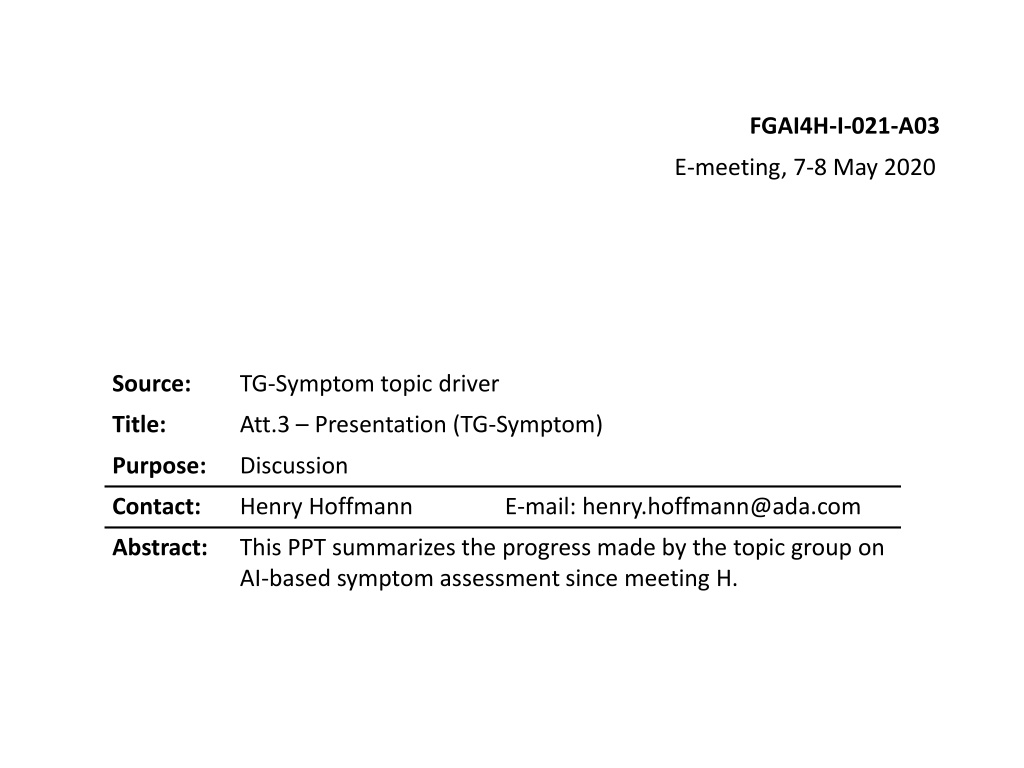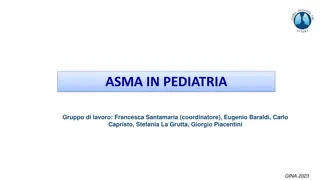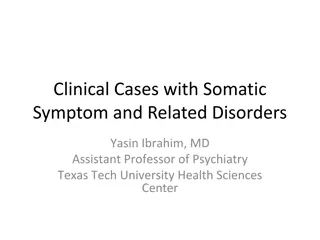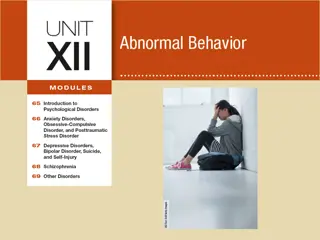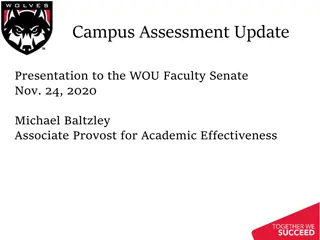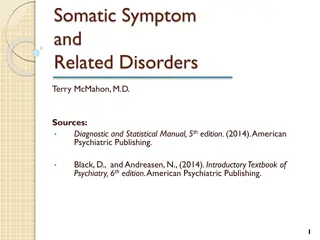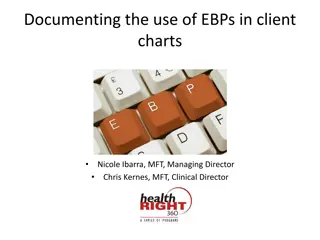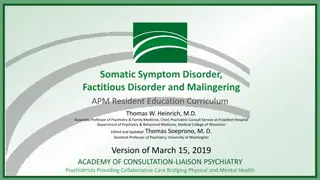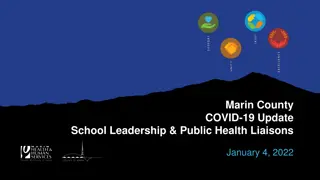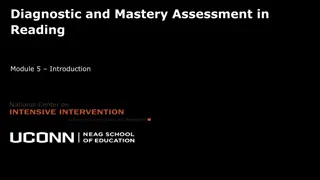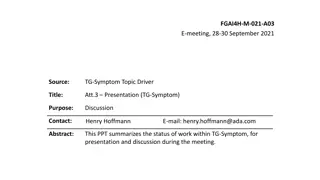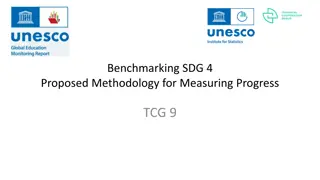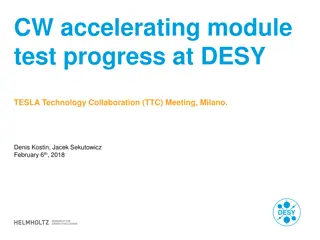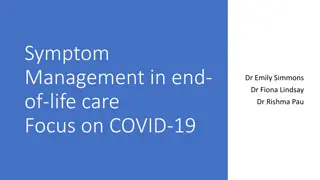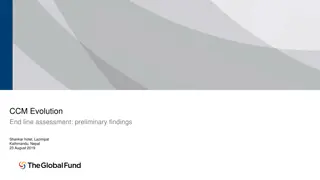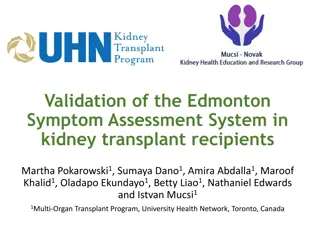Update on AI-Based Symptom Assessment Progress
This presentation summarizes the progress made by the topic group on AI-based symptom assessment since the E-meeting held on 7-8 May 2020. It covers the AI task related to symptom assessment, the journey and approach of the group so far, and the current status of the topic group members and contributors. The content outlines the various meetings, benchmarks, and initiatives undertaken by the group, highlighting the development of diagnostic self-assessment apps and the advancement towards pre-clinical triage and differential diagnosis using AI technology.
Download Presentation

Please find below an Image/Link to download the presentation.
The content on the website is provided AS IS for your information and personal use only. It may not be sold, licensed, or shared on other websites without obtaining consent from the author.If you encounter any issues during the download, it is possible that the publisher has removed the file from their server.
You are allowed to download the files provided on this website for personal or commercial use, subject to the condition that they are used lawfully. All files are the property of their respective owners.
The content on the website is provided AS IS for your information and personal use only. It may not be sold, licensed, or shared on other websites without obtaining consent from the author.
E N D
Presentation Transcript
FGAI4H-I-021-A03 E-meeting, 7-8 May 2020 Source: TG-Symptom topic driver Title: Att.3 Presentation (TG-Symptom) Purpose: Discussion Contact: Henry Hoffmann E-mail: henry.hoffmann@ada.com Abstract: This PPT summarizes the progress made by the topic group on AI-based symptom assessment since meeting H.
Meeting I Update for the Topic Group Symptom Assessment E-meeting, 7-8 May 2020
AI-based Symptom Assessment What is the AI task this TG deals with? Mobile/Web Applications sometimes called Symptom Checkers that Allow w users users to to enter enter current current Presenting Complaints (coded symptoms, free texts ) (INPUT) To then engage in a dialog similar to a doctor collecting To then engage in a dialog similar to a doctor collecting Additional symptoms, findings, factors, attributes, (lab, imaging, genetics, ) (INPUT) (INPUT) To finally provide the user with first advice To finally provide the user with first advice (OUTPUT) Pre-Clinical Triage (emergency, see doctor today, self-care ) Differential Diagnosis (disease A 93%, B 73% - e.g. in ICD10, SnomedCT) Additional diagnostic tests to perform, treatment advice, explanations (INPUT) (OUTPUT)
Journey & Approach What happened so far? Meeting A Meeting A Geneva A-020: Towards a potential AI4H use case "diagnostic self-assessment apps" Meeting C Meeting C Lausanne, 22 Lausanne, 22- -25 Topic Group created Approach: Approach: MMVB 1.0 MMVB N.0 MVB Meeting F Meeting F Zanzibar Zanzibar 2 2- -5 September 2019 First benchmarking with toy AI & toy Data Minimal Minimal Minimal Minimal viable viable Benchmarking MMVB 1.0 MMVB 1.0 Meeting G, H, I Meeting G, H, I Gradual increase of complexity Geneva, 25 , 25- -27 September 2018 27 September 2018 25 January January 2019 2019 MVB 5 September 2019 Benchmarking
Status of the Topic Group Overview Topic Group Members: Companies (14+1): Companies (14+1): 1DOC3, Ada, Babylon, Baidu, Buoy, Deepcare, Infermedica, Inspired Ideas, Isabel Healthcare, mfine, MyDoctor, Symptify, Visiba Care, xund.ai xund.ai, Your.MD Independent Independent contributors contributors (2+4): (2+4): Thomas Neumark, Muhammad Murhaba, Pritesh Osornio Osornio, Salman , Salman Razzaki Razzaki, , Yura Yura Perov Sub Sub- -Topic Groups Topic Groups Self-assessment Clinical symptom assessment fgai4htgsymptom@lists.itu.int fgai4htgsymptom@lists.itu.int 83 (27 more) 10 Online 10 Online meetings meetings since since meeting meeting H H (All with minutes/protocols in SharePoint) Pritesh Mistry Mistry, Alejandro , Alejandro Perov
Status of the Technical Work What we implemented since meeting H Continued MMVB 2.0 (Berlin Model) Implementation New dedicated separate frontend application (JS/TS, react, redux, saga, material, ) New more robust and scalable backend (Python, Django, MySQL, Celery, Redis, ) First dedicated case creation and annotation tool All in github Work on Work on Ontologies Ontologies Mapping of Berlin Model to SnomedCT Integration into the MMVB 2.0 work
Status of the Non-Technical Work The non-technical things we did TDD TDD work work Description of the technical developments Integration of Baidu s details Meeting I Status Update Refinement of literature analysis (R01) Summary of the ontology work (R01) Clinical Group Clinical Group Doctors formed a clinical group to work on scores & metrics Outreach Outreach & FG Interaction & FG Interaction Contribution to the revised C105 TDD document template (FG-AI4H- I-004) Worked with the clinical working group Refined the FG wide annotation tool idea Supported with Onboarding
Next Steps What to focus on until meeting J Continue MMVB 2.0 (Berlin Model) Finalization of the new backend, frontend and annotation tool Implementation of a Berlin model Toy-AI by each TG member Berlin model case synthesizer Test of case creation with the annotation tool by the TG doctors Conduction of the benchmarking on the Berlin model Reporting tool refinement MMVB 3.0 Workshop Ontologies, Authentication TDD & TDD & Outreach Outreach Clinical group works in scores & metrics Adoption for refined template structure
Thank you! WHO/ITU FG AI4H TG Symptom Assessment Meeting I E-meeting, 7-8 May 2020
